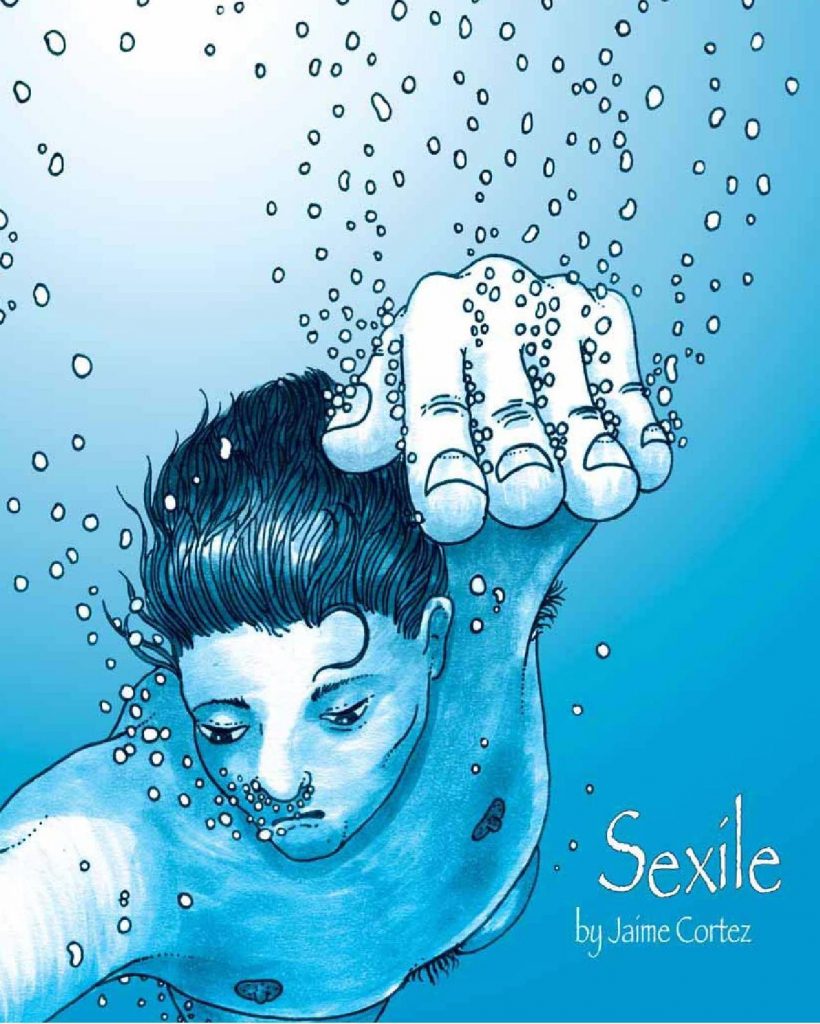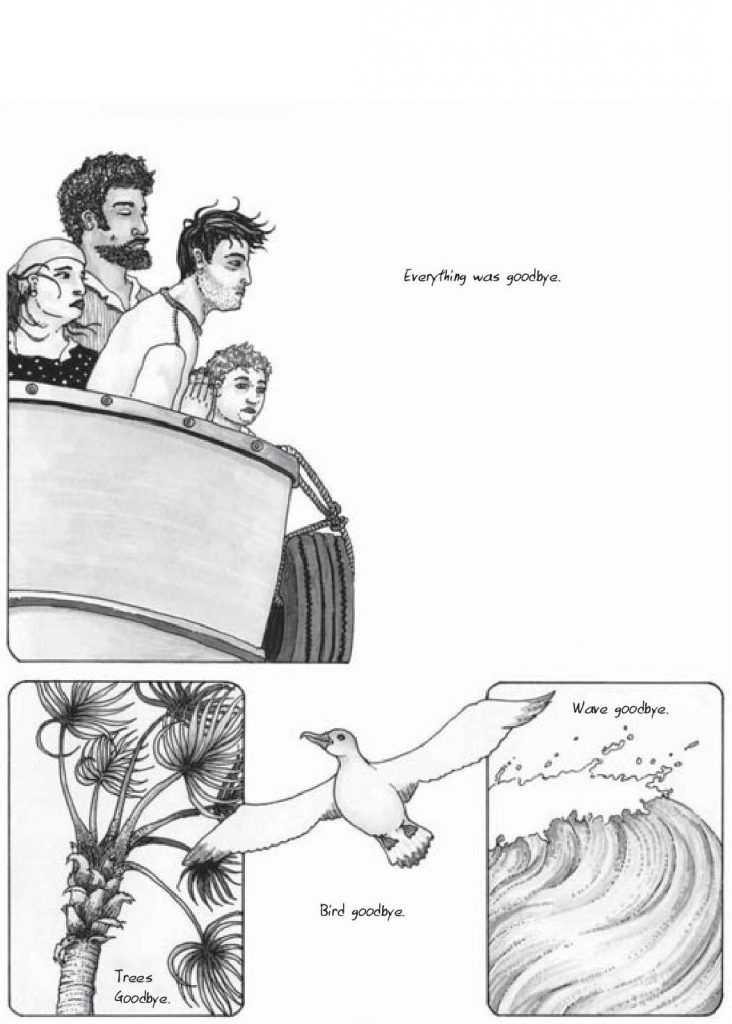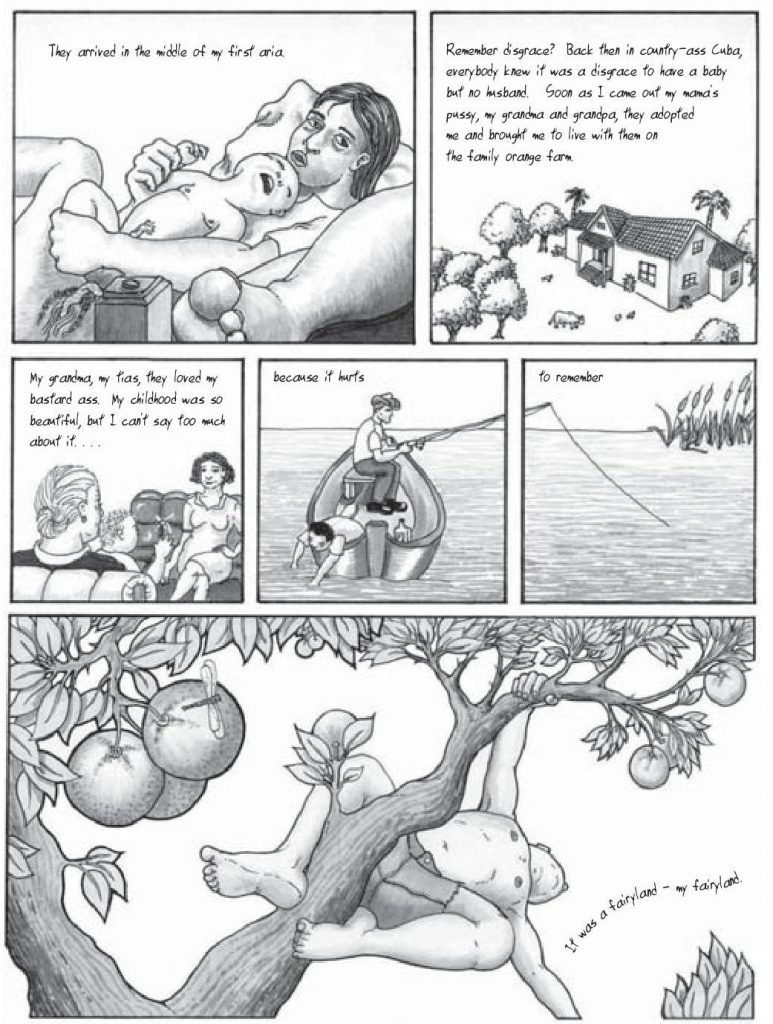
My introduction to graphic novels took place in a college class on Queer Theory. The professor drove me nuts, but he assigned stellar readings. His comics of choice, for which I am forever grateful, were Alison Bechdel’s Fun Home, and the lesser-known, but gorgeous, Sexile/Sexilio by Jaime Cortez.
I should mention: I’m also queer — something I didn’t discover, or admit, or realize, until that same year. I was fumbling around in my own sexuality, searching for media to connect with besides Buffy the Vampire Slayer. When I was lucky enough to lay eyes on these alternative, gay-as-hell comics, it completely turned my life upside down.
Over the years, I grew into my queer identity and I became a cartoonist. This month, I set out to reread Sexile/Sexilio to see if and how my interpretation of it might have changed. The first thing I was struck by was the fact that the book is not only out of print, making it difficult to obtain a physical copy, but that many aren’t even aware it exists. In hindsight, because of this comic’s significance in my life, its assignment in a class, and its well-honed artistic aesthetic, I had assumed this was a well-known and respected graphic novel. And while it may be the latter, it certainly isn’t the former.
It deserves that recognition — and more. Originally published in 2004 by the AIDS Project Los Angeles and the Gay Men’s Health Project as an HIV prevention publication, Sexile/Sexilio follows the journey of trans activist Adela Vasquez, who fled to the US from the political turmoil of Cuba in 1980.
Cortez does justice to Vasquez’s journey with astonishing draftsmanship in grays and blacks: meticulously shaded pencil and ink illustrations (at times with an exaggerated, cartoony bent reminiscent of R. Crumb’s) give way to the immediately seductive and loveable narrative voice of Adela. Her tale is told through interviews done by Cortez, and her humorous, poetic character is communicated through layouts of adeptly varied paneling. Pages fluctuate between full spreads of striking images that drive the heart of Vasquez’s story home with few words…

…While others jump between surrealist interpretations of emotion and panels of action.

Like any powerful comic, the pacing is expertly executed.
In Sexile, water becomes a symbol of migration, transition, and arrival in Vasquez’s story and the book flows like a current, pausing only for thoughtful moments that suspend the reader alongside Adela in wistful, ruminative still waters. Love and loss are sprinkled with a humorous self-awareness of both the absurdity and miraculous nature of her life — between a hypersexual childhood in Cuba, San Francisco’s Castro in its heyday of gay culture, the AIDS crisis, and Vasquez’s transition throughout. At one point, while working as a sex worker and addicted to coke, she muses, “Sometimes I’d think, my god, I used to be a math teacher.” It’s moments like these that endear the reader to Vasquez; even amidst struggle, her warm and vivacious nature emanates off the page.
While the sorrow and hurt of exile never quite go away, Cortez’s portrait of Vasquez living her truth in the U.S. is both hopeful and heart-rending. As a sexile (an apt title for both Adela and the book), she acknowledges that Cuba could not, and did not accept her on the basis of gender. Yet in the States, she persists through countless and enduring obstacles — harassment, sexism, racism, and addiction, to name a few — only to rise above it all and embrace the liminal spaces she occupies physically and symbolically.


Adela’s resilience and Cortez’s powerful visuals tell a story that feels as equally apropos in today’s world as it must have upon its release in 2004. At a time of aggressively anti-immigrant, anti-trans laws and attitudes, when trans women of color are murdered at least four times the rate of any other population (with that statistic growing, not shrinking), her story is a beacon of hope, reflection, and strength in a world that would seem to offer nothing but hostility.
In fact, rereading Sexile sixteen years after its publication, the only things that feel dated are the text and word bubbles. Cortez did these digitally in Illustrator with computerized lettering, making for a robotic feel in what is otherwise a completely organic book. I found this slightly distracting while reading, but then again, I’m a cartoonist with a penchant for comics lettered by hand. Cortez’s imagery — and the relevance of Adela’s story today — far outweigh this minor blip.
Like the waves in Vasquez’s beloved Cuba (beautifully captured by Cortez’s pencil and inks), this is a story that sweeps you up and under; it makes your heart sink and swell alongside its emotional peaks and troughs. While I was struck by the story’s significance upon my first reading back in 2012, Sexile remains as influential to me, if not more, as on the day I first read it. Now that I’m no longer a blissfully unaware college student enjoying the relative calm of the Obama presidency, and my understanding of privilege and identities has become more nuanced, the impact of Adela’s story is significantly underscored. As a queer person, this book is a reminder to hold my community close, to listen and support those on the margins of queer and trans communities, and to take nothing for granted. And as a cartoonist, I can only hope to tell stories as moving and as important as this.
The entire publication is available to download, for free, via Cortez’s website. And, if you’re able, send some love in the form of a donation to the Los Angeles AIDS Project or the Gay Men’s Health Crisis upon downloading.
You can download Sexile/Sexilio here.
SOLRAD is made possible by the generous donations of readers like you. Support our Patreon campaign, or make a tax-deductible donation to our publisher, Fieldmouse Press, today.

Leave a Reply